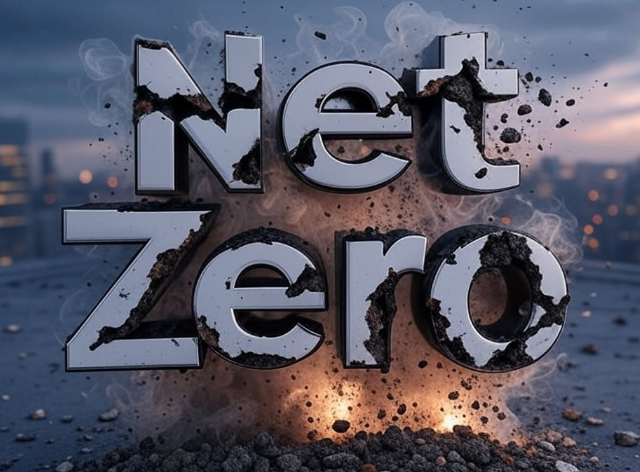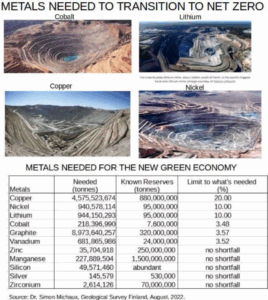In a hypothetical world, we take a quick look at what the UK would look like with no more net zero

Imagine waking up tomorrow to the news that the UK has boldly cast off the chains of net zero, a policy that’s been dragging the nation down like a colossal anchor, siphoning away resources from what truly matters. No more mandates for unreliable wind farms or sprawling solar panels that come with exorbitant price tags and climate communist land grabs, driving up energy costs and robbing people of their homes. Instead, a surge of freedom and practicality sweeps across the land, unleashing hydrocarbons, reliable, abundant oil, gas, and coal, to power homes, businesses, and industries at a fraction of the cost. Electricity bills plummet overnight as the grid stabilises on proven fuels, not intermittent renewables that require massive subsidies and backups. The everyday person feels it immediately: cheaper heating in winter, lower transport costs, and a cost of living that finally eases, putting more money back in pockets for families to thrive, not just survive.
Dropping net zero would be a liberation from a narrative built on falsehoods about CO2, a gas that’s been vilified through years of brainwashing, convincing people it’s a villain when, in reality, it’s the essence of life itself. CO2 is plant food, fuelling greener landscapes, higher crop yields, and a more vibrant planet. We’ve seen the Earth greening thanks to rising levels, with forests expanding and agriculture booming. More CO2 means stronger ecosystems, better food security, and a world that’s far from the doom painted by alarmists. The idea that humanity’s emissions are catastrophically altering the climate is a myth, overblown and unsupported when you look beyond the echo chambers. Dropping this obsession reveals the truth: none of this sacrifice was ever necessary, just a web of misinformation that’s held back progress.
And let’s talk about the UK’s role in all this, it’s utterly insignificant as shown in these easy to understand graphs. The nation accounts for less than 1% of global CO2 emissions, a drop in the ocean compared to industrial giants like China or India, who continue unabated while the UK ties itself in knots. Even if the UK slashed every last emission to zero, the global temperature wouldn’t budge a fraction of a degree. It’s like one person turning off their light in a stadium full of floodlights, pointless virtue signalling that’s cost us dearly.
What Could We Spend The Money On Instead?

Now, picture the windfall: that staggering £800 billion earmarked for net zero, a figure straight from the fiscal watchdog’s latest assessment, suddenly freed up over the coming decades. This isn’t pocket change; it’s a transformative fortune that could rebuild the UK from the ground up, focusing on what actually uplifts lives. Hospitals, long neglected and overburdened, could see £200 billion poured into state-of-the-art facilities—new wings for emergency care, advanced diagnostic equipment, and expanded mental health services, slashing wait times and saving lives. Schools would get £150 billion to modernise classrooms, integrate cutting-edge technology, and hire more teachers, giving every child a world-class education without crumbling buildings or outdated resources.
Water infrastructure, plagued by leaks and outdated pipes leading to floods and shortages, could absorb £100 billion for comprehensive upgrades, resilient reservoirs, and flood defences that protect communities year-round. Roads and bridges, pothole-riddled and congested, might claim £100 billion for smooth highways, expanded public transport, and high-speed rail links that connect cities efficiently, boosting commerce and cutting commute times. Energy security gets a boost with £100 billion reinvested in hydrocarbon exploration and refinement, drilling new North Sea wells, building efficient gas plants, and ensuring affordable, reliable power that doesn’t falter when the wind dies down. Maybe we could even start getting involved with the AI race instead of watching the USA and China from the sidelines.
The rest? £150 billion could turbocharge neglected areas like affordable housing, building thousands of new homes with modern insulation powered by cheap gas, not forcing expensive electric conversions. Prisons, police stations, and community centres could be revitalised, creating safer neighbourhoods. Even cultural gems like museums and parks get a slice, enriching daily life. This reinvestment sparks a renaissance: jobs explode in construction, engineering, and energy sectors; businesses flourish with lower overheads; and innovation thrives without the dead weight of green mandates. We could afford to make university free for every native UK citizen which only costs about £15 billion, investing in our future for decades to come, instead of blowing it all down the net zero drain. Imagine how much less stress would be on our up and coming youngsters without the relatively massive debt burden just to get an education. When the climate cult waste our money on this net zero fantasy we should be outraged, it is our children’s future being destroyed, it is our elderly’s living conditions being ruined and everyone is suffering all because the climate cult have an insatiable delusional idea of net zero.
Industry Would Boom

With the shackles of net zero removed, the UK’s industrial landscape would explode into a golden age of growth, powered by deregulated energy markets and dirt-cheap electricity from reliable hydrocarbons. No more suffocating mandates forcing companies to chase impossible emission targets, install costly carbon-capture gimmicks, or subsidise inefficient renewables that jack up power prices. Instead, businesses tap into abundant oil, gas, and coal, slashing energy bills by up to 50% or more, as grids run on steady, baseload fuels without the need for expensive backups or intermittency headaches. This isn’t just cost savings—it’s rocket fuel for productivity, innovation, and job creation, turning the UK into a manufacturing powerhouse once again, attracting global investment and outpacing competitors still bogged down in green bureaucracy.Key sectors currently on life support due to net zero’s burdensome regulations would roar back to life:
- Steel and Heavy Manufacturing: Plagued by sky-high carbon taxes under the UK Emissions Trading Scheme and EU-inspired rules that add millions in compliance costs, British steel mills have shuttered or relocated abroad, hemorrhaging thousands of jobs. Ditching net zero scraps these penalties, allowing furnaces to fire up on affordable coal and gas, reviving production in places like Port Talbot and Scunthorpe. Output surges, exports boom, and the sector alone could add £10-15 billion to GDP annually, with new apprenticeships flooding in for skilled workers.
- Automotive Industry: Forced into an EV obsession with bans on new petrol/diesel sales by 2035 and hefty subsidies for battery tech that relies on foreign supply chains, carmakers like Jaguar Land Rover and Nissan face crippling transition costs and supply shortages. Without these edicts, factories pivot back to efficient internal combustion engines, slashing R&D expenses and vehicle prices. Cheaper electricity powers assembly lines non-stop, boosting exports to non-net-zero markets and creating 50,000+ jobs in the supply chain, from parts manufacturing to logistics.
- Chemical and Petrochemical Sector: Hit hard by emission caps and phase-outs of fossil feedstocks, firms like Ineos struggle with regulations that inflate operational costs by 20-30%, driving production overseas. Freed from net zero, they expand using cheap natural gas as both fuel and raw material, innovating in plastics, fertilisers, and pharmaceuticals. This could double output in hubs like Grangemouth, enhancing food security through better crop yields and adding billions in high-value exports.
- Agriculture and Food Processing: Farmers grapple with net zero’s fertiliser restrictions, livestock emission taxes, and land grabs for solar/wind farms, eroding margins and forcing farm closures. Removing these lets growers use affordable energy for irrigation, machinery, and greenhouses, while higher CO2 levels naturally boost yields. Food prices drop, rural economies thrive with new processing plants, and the sector sheds its dependency on subsidies, potentially growing by 15-20% as exports to hungry global markets take off.
Across these industries, the ripple effects are massive: supply chains shorten, innovation accelerates, and foreign direct investment pours in as the UK becomes the low-regulation, low-cost energy haven of Europe. Unemployment plummets in industrial heartlands, wages rise, and the economy hums with the efficiency of a well-oiled machine, literally. This boom isn’t hypothetical; it’s the natural outcome when we prioritise real progress over eco-fantasies, proving that ditching net zero doesn’t just save money, it multiplies it.
The Birth Rate Would Increase And Our People Would Be Happier

Mental health, too, gets a profound uplift in this revitalised landscape. The constant stress of high bills, job insecurity from green job transitions that never materialised, and the pervasive fear-mongering about climate catastrophe evaporate, replaced by abundance and hope. With £200 billion boosting healthcare, mental health services expand dramatically: more therapists, community programs, and preventive care mean shorter waits and better support for anxiety, depression, and burnout. Lower costs free up disposable income for hobbies, vacations, and social connections, while improved infrastructure, like safer roads, greener parks from actual CO2 benefits, and vibrant communities, creates a sense of belonging and purpose. Studies show that economic security is a top predictor of mental well-being; in this post-net zero era, suicide rates could drop, productivity soar, and overall happiness indices climb as the nation sheds the psychological weight of unnecessary sacrifices and bins climate anxiety for good. It’s a virtuous cycle: healthier minds build stronger families, and rising birthrates signal a society that’s not just surviving, but flourishing with renewed vigour.
Join The Fight And Help Us Defeat Net Zero For Good
In this brighter future of no net zero, the UK stands tall, prosperous, and unburdened, proving that true progress comes from embracing reality over fear-mongering. People would awaken to the realisation that they’ve been fed distortions about CO2 and climate, and with that anchor lifted, the nation sails forward into an era of abundance, where energy is cheap, infrastructure gleams, and every citizen reaps the rewards. It’s not just possible, it’s exhilarating, a testament to what happens when common sense prevails. we would reclaim our position as a world leader in the good in this world.
And guess what? The climate wouldn’t blink an eye if the UK just dropped net zero completely and carried on doing what we should be doing, advancing our peoples, nation, and the world into a more prosperous future. |
This hypothetical world doesn’t have to be a dream, we can create it together. We do this by fighting effectively, learning constructively and educating our communities about the truth on everything related To The Climate Con.
The Advanced Guide To The Climate Con
The Beginners Guide To The Climate Con
Continue Your Learning

Climate Working Group Disbanded
Our enemies cannot handle a debate because the truth is too powerful. Instead, they do everything possible to silence opposition.

Net Zero Is Mathematically Impossible
Not only does net zero fail a logic test, it fails a maths test even more significantly. Numbers and facts don’t lie, no matter how loud the climate cult cry.

A Ridiculous Foray into Eco-Fantasy: The Vatican’s “Borgo Laudato Si” A New Climate Cult Centre
For some reason the pope is joining the ranks of the climate cult and is opening a new eco centre to supposedly inspire others to join the climate cult.

Net Zero Banking Alliance Defeated
The net zero banking alliance all but admits defeat as they pause operations and their future hangs in the balance of a members vote.

The Climate Is Always Changing And That’s A Good Thing
The climate is always changing and that is a good thing. I could adapt to it being a bit warmer in the UK quicktime, how about you?

Oil Rig Parts Maker Nearly Completely Abandons Operations Due To ‘cult of carbon’
The UK is getting left behind as the decimation of our industry continues under the banner of net zero. When we realise we don’t need any of this and claim our true abundant destiny?
Our Products
-
Accessories
I Love CO2 Sticker
£3.33 – £3.83 This product has multiple variants. The options may be chosen on the product page -
Accessories
The Climate Has Always Changed Sticker
£3.33 – £3.83 This product has multiple variants. The options may be chosen on the product page -
Accessories
No Digital ID Stickers – International
£3.50 – £4.00 This product has multiple variants. The options may be chosen on the product page -
Accessories
Stuck Farmer T-Shirt
£18.00 – £24.00 This product has multiple variants. The options may be chosen on the product page
Track The Cost Of Net Zero
Stay ahead of the transition with real-time cost monitoring and optimization tools.
Access Cost Trackers →















